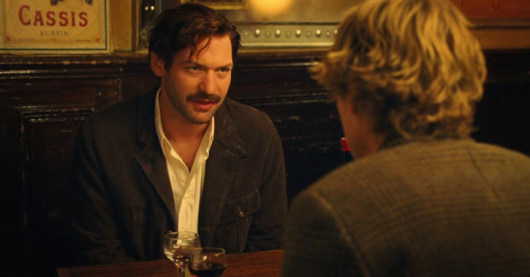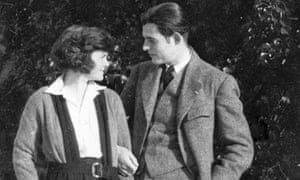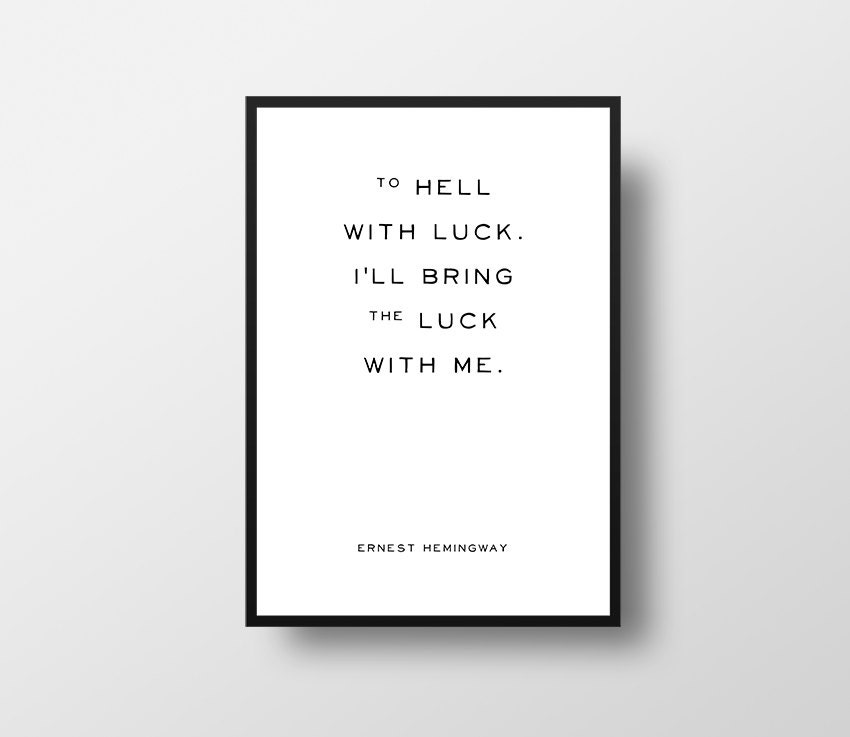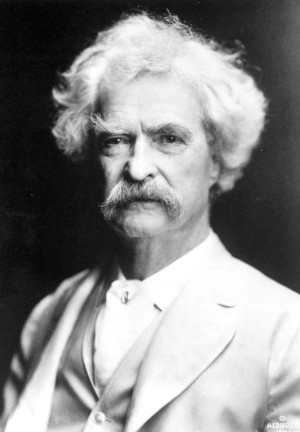According to ECCLESIASTES without God in the picture our lives UNDER THE SUN will accomplish nothing that lasts. King Solomon the author Ecclesiastes asked, “What does man gain by all the toil at which he toils UNDER THE SUN?” and Solomon answered his own question with the answer in 2:17, “So I hated life, because what is done under the sun was grievous to me, for all is vanity and a striving after wind.” Woody Allen and Mark Twain have said this very same thing.


HEMINGWAY:You like Mark Twain?
SCOTT FITZGERALD: I’m going to find Zelda.I don’t like the thought of her with that Spaniard.
GIL PENDER:May I?
HEMINGWAY:Yeah,

GIL PENDER:I’m actually a huge Mark Twain fan.I think you can even make the case that all modern American literature comes from Huckleberry Finn.-

A Depressingly “Ecclesiastical” Perspective by Mark Twain
As I was drawn into the Autobiography of Mark Twain, the following paragraph nearly drove me to despair…then I remembered the Gospel…
A myriad of men are born; they labor and sweat and struggle for bread; they squabble and scold and fight; they scramble for little mean advantages over each other; age creeps upon them; infirmities follow; shames and humiliations bring down their prides and their vanities; those they love are taken from them, and the joy of life is turned to aching grief. The burden of pain, care, misery, grows heavier year by year; at length, ambition is dead, pride is dead; vanity is dead; longing for release is in their place. It comes at last–the only unpoisoned gift earth ever had for them–and they vanish from a world where they were a mistake and a failure and a foolishness; there they have left no sign that they have existed–a world which will lament them a day and forget them forever. Then another myriad takes their place, and copies all they did, and goes along the same profitless road, and vanishes as they vanished–follow the same arid path through the same desert, and accomplish what the first myriad, and all the myriads that came after it, accomplished–nothing!
–Autobiography of Mark Twain (US: Seven Treasures, 2010), 25.
If I didn’t know better, I’d claim plagiarism…but perhaps the writer of Ecclesiastes, and Twain himself, would celebrate the irony that these words are nothing new, but a repetition of the Teacher’s words in the OT. Sadly, Twain does not come to the same conclusion that the writer of Ecclesiastes does:
The end of the matter; all has been heard:
Fear God and keep his commandments, for this is the whole duty of man.
For God will bring every deed into judgment, with every secret thing, whether good or evil.
Ecclesiastes 12:13-14
Jimmy Young of GRACE EVANGELICAL CHURCH Memphis, TN paints a very similar picture in his sermon on Ecclesiastes:
T.S.Eliot once said we humans can’t bear much reality of which this world is full.

(Actor David Lowe played poet T.S. Eliot in the movie MIDNIGHT IN PARIS)
Life is meaningless according to 1:2 and then he says in verse 3 “What does man gain by all the toil at which he toils under the sun?” Then Solomon sighs in 1:8 “All things are full of weariness; a man cannot utter it; the eye is not satisfied with seeing, nor the ear filled with hearing.” That is the sentiment that is woven all through the Book of Ecclesiastes. 1:2 “Vanity[b] of vanities, says the Preacher, vanity of vanities! All is vanity.” He uses the word VANITY 35 times in the Book of Ecclesiastes.
Why is Ecclesiastes in the Bible? This is a tale of searching, experimenting, grasping for meaning and purpose.
Ecclesiastes 1:12-14, 17: 12 I the Preacher have been king over Israel in Jerusalem. 13 And I applied my heart[f] to seek and to search out by wisdom all that is done under heaven. It is an unhappy business that God has given to the children of man to be busy with. 14 I have seen everything that is done under the sun, and behold, all is vanity[g] and a striving after wind.[h] 17 And I applied my heart to know wisdom…
Solomon is saying that he is going to conduct a series of experiments in several areas of his life and try to find meaning in life. So in Ecclesiastes you have a report of that.
[At this point Dr. Young goes through the Book of Ecclesiastes and points out that nothing in life gives true satisfaction without God including knowledge (1:16-18), ladies and liquor (2:1-3, 8, 10, 11), and great building projects (2:4-6, 18-20).]
Ecclesiastes 1:1-3 English Standard Version (ESV)
All Is Vanity
1 The words of the Preacher,[a] the son of David, king in Jerusalem.
2 Vanity[b] of vanities, says the Preacher,
vanity of vanities! All is vanity.
3 What does man gain by all the toil
at which he toils under the sun?
Ecclesiastes 2:1-25 English Standard Version (ESV)
The Vanity of Self-Indulgence
2 I said in my heart, “Come now, I will test you with pleasure; enjoy yourself.” But behold, this also was vanity.[a] 2 I said of laughter, “It is mad,” and of pleasure, “What use is it?” 3 I searched with my heart how to cheer my body with wine—my heart still guiding me with wisdom—and how to lay hold on folly, till I might see what was good for the children of man to do under heaven during the few days of their life. 4 I made great works. I built houses and planted vineyards for myself. 5 I made myself gardens and parks, and planted in them all kinds of fruit trees. 6 I made myself pools from which to water the forest of growing trees. 7 I bought male and female slaves, and had slaves who were born in my house. I had also great possessions of herds and flocks, more than any who had been before me in Jerusalem. 8 I also gathered for myself silver and gold and the treasure of kings and provinces. I got singers, both men and women, and many concubines,[b] the delight of the sons of man.
9 So I became great and surpassed all who were before me in Jerusalem. Also my wisdom remained with me. 10 And whatever my eyes desired I did not keep from them. I kept my heart from no pleasure, for my heart found pleasure in all my toil, and this was my reward for all my toil.11 Then I considered all that my hands had done and the toil I had expended in doing it, and behold, all was vanity and a striving after wind, and there was nothing to be gained under the sun.
The Vanity of Living Wisely
12 So I turned to consider wisdom and madness and folly. For what can the man do who comes after the king? Only what has already been done. 13 Then I saw that there is more gain in wisdom than in folly, as there is more gain in light than in darkness. 14 The wise person has his eyes in his head, but the fool walks in darkness. And yet I perceived that the same event happens to all of them. 15 Then I said in my heart, “What happens to the fool will happen to me also. Why then have I been so very wise?” And I said in my heart that this also is vanity. 16 For of the wise as of the fool there is no enduring remembrance, seeing that in the days to come all will have been long forgotten. How the wise dies just like the fool! 17 So I hated life, because what is done under the sun was grievous to me, for all is vanity and a striving after wind.
The Vanity of Toil
18 I hated all my toil in which I toil under the sun, seeing that I must leave it to the man who will come after me, 19 and who knows whether he will be wise or a fool? Yet he will be master of all for which I toiled and used my wisdom under the sun. This also is vanity. 20 So I turned about and gave my heart up to despair over all the toil of my labors under the sun, 21 because sometimes a person who has toiled with wisdom and knowledge and skill must leave everything to be enjoyed by someone who did not toil for it. This also is vanity and a great evil.22 What has a man from all the toil and striving of heart with which he toils beneath the sun? 23 For all his days are full of sorrow, and his work is a vexation. Even in the night his heart does not rest. This also is vanity.
24 There is nothing better for a person than that he should eat and drink and find enjoyment[c] in his toil. This also, I saw, is from the hand of God, 25 for apart from him[d] who can eat or who can have enjoyment?26 For to the one who pleases him God has given wisdom and knowledge and joy, but to the sinner he has given the business of gathering and collecting, only to give to one who pleases God. This also is vanity and a striving after wind.
__
Four summary statements concerning the Book of Ecclesiastes:
- If there is nothing but vanity UNDER THE SUN (or under heaven) then our only hope must be ABOVE HEAVEN.
One commentary said, “To make any sense of the world you have to go outside of it.” That treadmill you are on that is by design. The restlessness of life that can be traced back to the will of God so you might have the same despair that Solomon had. Therefore, you will keep on looking until you find the meaning ABOVE THE SUN. God is demolishing so he can rebuild. God is removing all those things that you thought were going to give you meaning so you will come to the same conclusion that Solomon came to.
2. If a man who had everything and investigated everything Visible and then the one thing that we must need is something that is invisible, peace, contentment and meaning, can only be found in a real relationship with Jesus Christ.
3. When you remove Jesus from the center of an intellectual pursuit or a pursuit of pleasure, or meaning or whatever, you will end up in vanity.
(Pictured below Mariel Hemingway and Woody Allen in the movie MANHATTAN)

Woody Allen is a brilliant filmmaker but he wrote this speech and it is a fictional parady on speeches to graduates:
by Woody Allen
First published in the New York Times in 1979
More than at any other time in history, mankind faces a crossroads. One path leads to despair and utter hopelessness. The other, to total extinction. Let us pray we have the wisdom to choose correctly.
I speak, by the way, not with any sense of futility, but with a panicky conviction of the absolute meaninglessness of existence which could easily be misinterpreted as pessimism.
It is not. It is merely a healthy concern for the predicament of modern man. (Modern man is here defined as any person born after Nietzsche’s edict that “God is dead,” but before the hit recording “I Wanna Hold Your Hand.”) This “predicament” can be stated one of two ways, though certain linguistic philosophers prefer to reduce it to a mathematical equation where it can be easily solved and even carried around in the wallet.
Put in its simplest form, the problem is: How is it possible to find meaning in a finite world given my waist and shirt size?
This is a very difficult question when we realize that science has failed us. True, it has conquered many diseases, broken the genetic code, and even placed human beings on the Moon, and yet when a man of eighty is in a room with two eighteen-year-old cocktail waitresses nothing happens. Because the real problems never change.
After all, can the human soul be glimpsed through a microscope? Maybe–but you’d definitely need one of those very good ones with two eyepieces. We know that the most advanced computer in the world does not have a brain as sophisticated as that of an ant. True, we could say that of any of our relatives but we only have to put up with them at weddings or special occasions.
True, science has taught us how to pasteurize cheese. And true, this can be fun in mixed company--but what of the H-bomb? Have you ever seen what happens when one of those things falls off a desk accidentally?
And where is science when one ponders the eternal riddles? How did the cosmos originate? How long has it been around? Did matter begin with an explosion or by the word of God?

My good friend Jacques Monod spoke often of the randomness of the cosmos. He believed everything in existence occurred by pure chance with the possible exception of his breakfast, which he felt certain was made by his housekeeper.
Instead of facing these challenges we turn instead to distractions like drugs and sex. We live in far too permissive a society. Never before has pornography been this rampant. And those films are lit so badly!
We are a people who lack defined goals. We have never leaned to love. We lack leaders and coherent programs. We have no spiritual center. We are adrift alone in the cosmos wreaking monstrous violence on one another out of frustration and pain. Fortunately, we have not lost our sense of proportion.
Summing up, it is clear the future holds great opportunities. It also holds pitfalls. The trick will be to avoid the pitfalls, seize the opportunities, and get back home by six o’clock.
__
When you remove Jesus from the center of an intellectual pursuit or a pursuit of pleasure, or meaning or whatever, you will end up in vanity.
Mark 8:34-38 English Standard Version (ESV)
34 And calling the crowd to him with his disciples, he said to them, “If anyone would come after me, let him deny himself and take up his cross and follow me. 35 For whoever would save his life[a] will lose it, but whoever loses his life for my sake and the gospel’s will save it. 36 For what does it profit a man to gain the whole world and forfeit his soul?37 For what can a man give in return for his soul? 38 For whoever is ashamed of me and of my words in this adulterous and sinful generation, of him will the Son of Man also be ashamed when he comes in the glory of his Father with the holy angels.”
4. Once sin entered the world all pursuits became vanity.

John Steinbeck wrote in 1959, “{There is} a creeping, all pervading nerve-gas of immorality which starts in the nursery and does not stop before it reaches the highest offices both corporate and governmental.”
Recently I was on a plane and had a chance to read the article, “Probing the Heart of French Malaise,” APRIL 13, 2015 and here is a portion of the article:
PARIS — France is in the throes of a unique cultural moment — one that stretches way beyond the soul-searching debates over Islamist violence and Muslim integration, or arguments over its economic travails, fractious labor politics and troubling brain drain. This collective angst has crystallized as two of the country’s most prominent and controversial authors — Eric Zemmour and Michel Houellebecq — published blockbuster books warning of the creeping Islamization of France just as the Charlie Hebdo attacks shook the nation. Though both men foresee a France falling prey to militant Islam, there is more to their vision of the country’s past, and future, than meets the eye. Both offer a unique window into the French mind….

(Above picture is Charlie Hebdo office in Paris after shooting)
Below are four pictures.
- Target: After halting their car, the terrorists fire assault rifles at a policeman who tried to stop them, following the massacre at the satirical magazine Charlie Hebdo in Paris
2. Helpless: The gunmen move in on the officer as Ahmed Merabet – who is believed to have been a Muslim – lies wounded on the pavement. Pleading: Mr Merabet, 42, who was married, raises his hand in an appeal for mercy as the terrorists approach him with their weapons
3. Callous: One of the terrorists fires at the officer at point-blank range. The attack took place on Wednesday and killed 12 people.
4. Killing: Leaving the 42-year-old married officer to die, they run off, sparking a massive manhunt which was continuing last night

Mr. Houellebecq is a finer psychologist than Mr. Zemmour. It is hard to read tales of everyday Western youth dropping everything to join ISIS and not conclude that there is something to the idea that postmodern anomie and libertinism leave a secret part of us craving an all-embracing, confident, life-shaping creed.
In the end, what Mr. Zemmour and Mr. Houellebecq have in common is not a critique of Islam or immigration, which is really secondary to their concerns. Instead, what they have in common is that they point to real wounds in the French soul, wounds that too often go unmentioned — wounds for which they freely admit they have no cure.
____
Sadly Hemingway and Twain never looked ABOVE THE SUN for the answer and they were left with the impossibility of finding solutions UNDER THE SUN and that is what King Solomon demonstrates in the Book of Ecclesiastes.

“The two most important days in your life are the day you are born . . . and the day you find out why. — Mark Twain”

__

Hadley and Ernest Hemingway in Chamby, Switzerland, 1922. Photograph: Ernest Hemingway Photograph Collection, John F. Kennedy Presidential Library and Museum, Boston. Ernest Hemingway Photograph Collection, John F. Kennedy Presidential Library and Museum, Boston./PR
Midnight in Paris OST – 13 – Barcarolle from ‘The Tales of Hoffman’
_______

This series deals with the Book of Ecclesiastes and Woody Allen films. The first post dealt with MAGIC IN THE MOONLIGHT and it dealt with the fact that in the Book of Ecclesiastes Solomon does contend like Hobbes and Stanley that life is “nasty, brutish and short” and as a result has no meaning UNDER THE SUN.
The movie MIDNIGHT IN PARIS offers many of the same themes we see in Ecclesiastes. The second post looked at the question: WAS THERE EVER AGOLDEN AGE AND DID THE MOST TALENTED UNIVERSAL MEN OF THAT TIME FIND TRUE SATISFACTION DURING IT?
In the third post in this series we discover in Ecclesiastes that man UNDER THE SUN finds himself caught in the never ending cycle of birth and death. The SURREALISTS make a leap into the area of nonreason in order to get out of this cycle and that is why the scene in MIDNIGHT IN PARIS with Salvador Dali, Man Ray, and Luis Bunuel works so well!!!! These surrealists look to the area of their dreams to find a meaning for their lives and their break with reality is only because they know that they can’t find a rational meaning in life without God in the picture.
The fourth post looks at the solution of WINE, WOMEN AND SONG and the fifth and sixth posts look at the solution T.S.Eliot found in the Christian Faith and how he left his fragmented message of pessimism behind. In the seventh post the SURREALISTS say that time and chance is all we have but how can that explain love or art and the hunger for God? The eighth post looks at the subject of DEATH both in Ecclesiastes and MIDNIGHT IN PARIS. In the ninth post we look at the nihilistic worldview of Woody Allen and why he keeps putting suicides into his films.
In the tenth post I show how Woody Allen pokes fun at the brilliant thinkers of this world and how King Solomon did the same thing 3000 years ago. In the eleventh post I point out how many of Woody Allen’s liberal political views come a lack of understanding of the sinful nature of man and where it originated. In the twelfth post I look at the mannishness of man and vacuum in his heart that can only be satisfied by a relationship with God.
In the thirteenth post we look at the life of Ernest Hemingway as pictured in MIDNIGHT AND PARIS and relate it to the change of outlook he had on life as the years passed. In the fourteenth post we look at Hemingway’s idea of Paris being a movable feast. The fifteenth and sixteenth posts both compare Hemingway’s statement, “Happiness in intelligent people is the rarest thing I know…” with Ecclesiastes 2:18 “For in much wisdom is much vexation, and he who increases knowledge increases sorrow.” The seventeenth post looks at these words Woody Allen put into Hemingway’s mouth, “We fear death because we feel that we haven’t loved well enough or loved at all.”
In MIDNIGHT IN PARIS Hemingway and Gil Pender talk about their literary idol Mark Twain and the eighteenth post is summed up nicely by Kris Hemphill‘s words, “Both Twain and [King Solomon in the Book of Ecclesiastes] voice questions our souls long to have answered: Where does one find enduring meaning, life purpose, and sustainable joy, and why do so few seem to find it? The nineteenth post looks at the tension felt both in the life of Gil Pender (written by Woody Allen) in the movie MIDNIGHT IN PARIS and in Mark Twain’s life and that is when an atheist says he wants to scoff at the idea THAT WE WERE PUT HERE FOR A PURPOSE but he must stay face the reality of Ecclesiastes 3:11 that says “God has planted eternity in the heart of men…” and THAT CHANGES EVERYTHING! Therefore, the secular view that there is no such thing as love or purpose looks implausible. The twentieth post examines how Mark Twain discovered just like King Solomon in the Book of Ecclesiastes that there is no explanation for the suffering and injustice that occurs in life UNDER THE SUN. Solomon actually brought God back into the picture in the last chapter and he looked ABOVE THE SUN for the books to be balanced and for the tears to be wiped away.
The twenty-first post looks at the words of King Solomon, Woody Allen and Mark Twain that without God in the picture our lives UNDER THE SUN will accomplish nothing that lasts.
Woody Allen talks ‘Midnight in Paris’
AT THE 27 MIN MARK Woody Allen says:
I have never gotten to the point where I can give an optimistic view of anything. I have these ideas for stories that I hope are entertaining and I am always criticized for being pessimistic or nihilistic. To me this is just a realistic appraisal of life. There are these little Oasis’s these little distractions you get. Last night I was caught up in the Bulls and Heat basketball game on television and for the time being I was thinking about who was going to win. I wasn’t thinking about my mortality or the fact that I am finite and aging. That was not on my mind. Labron James was on my mind and the game. That is the best you can do is get a little detraction. What I have learned over the years is that there is no other solution to it. There is no satisfying answer. There is no optimistic answer I can give anybody.
The outcome of that basketball game is no less meaningful or no more meaningful than human life if you take the long view of it. You could look at the earth and say who cares about those creatures running around there and just brush it. Ernest Hemingway in one of his stories ( A FAREWELL TO ARMS) is looking at a burning log with ants running on it. This is the kind of thinking that has over powered me over the years and slips into my stories.
I have always been an odd mixture, completely accidentally, I was a nightclub comic joke writer whose two biggest influences were Groucho Marx, who I have always adored and he still makes me laugh and Igmar Bergman. I have always had a morbid streak in my work and I when I do something that works , it works to my advantage because it gives some substance and depth to the story, but I when I fail the thing could be too grim or too moralizing or not interesting enough. Then someone will say we only like you when you are funny.
Related posts:
Related posts:


